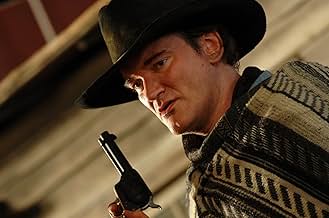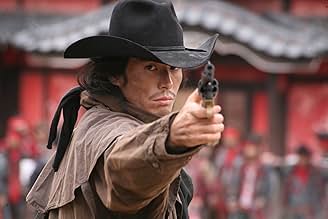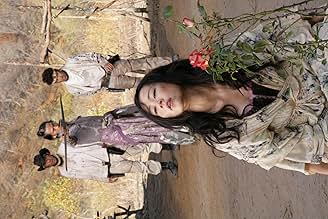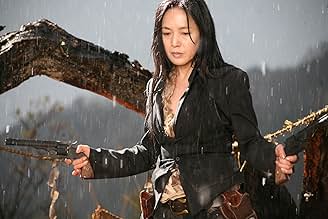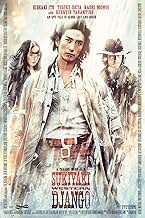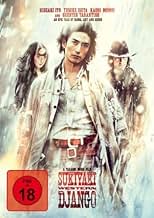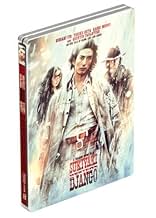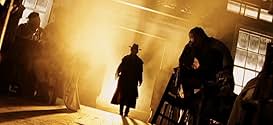IMDb RATING
6.1/10
16K
YOUR RATING
A nameless gunfighter arrives in a town ripped apart by rival gangs and, though courted by both to join, chooses his own path.A nameless gunfighter arrives in a town ripped apart by rival gangs and, though courted by both to join, chooses his own path.A nameless gunfighter arrives in a town ripped apart by rival gangs and, though courted by both to join, chooses his own path.
- Awards
- 4 wins & 5 nominations total
- Director
- Writers
- All cast & crew
- Production, box office & more at IMDbPro
Featured reviews
Sometimes a film presents itself to you as a character, whole in definition, with whom you have to deal. This is possible either because the film has a soul that the artist has created, or because the filmmaker borrows one by hijacking a genre. That is what Miike has done here. Though some of his other experiments sit well with me, this does not.
Dealing with such a character is not a simple emotional (and sometimes intellectual) transaction. Sometimes it is a struggle, a contest where each party wants to pull the other into their own world. Even these than be worthwhile, but the chances go way down; motives get questioned, selves get examined when you have to struggle.
I saw this together with 'Rango.' Same strategy, and even many of the same references. But as thin as Rango was, it presented a worthy character. Whether you choose to argue or even try to win is up to you. But at least you should choose your encounters wisely.
Ted's Evaluation -- 1 of 3: You can find something better to do with this part of your life.
Dealing with such a character is not a simple emotional (and sometimes intellectual) transaction. Sometimes it is a struggle, a contest where each party wants to pull the other into their own world. Even these than be worthwhile, but the chances go way down; motives get questioned, selves get examined when you have to struggle.
I saw this together with 'Rango.' Same strategy, and even many of the same references. But as thin as Rango was, it presented a worthy character. Whether you choose to argue or even try to win is up to you. But at least you should choose your encounters wisely.
Ted's Evaluation -- 1 of 3: You can find something better to do with this part of your life.
I'm not entirely sure I understood the plot of Sukiyaki Western Django, mainly because I couldn't understand the dialogue very well, but I still can say it's unlike anything I have ever seen. In a time when ridiculously unoriginal films are hailed by critics and average viewers alike, it's great to see something truly different come to the screen. Sukiyaki Western Django takes the oldest subgenre in American cinema, the western, and spins it until it is original againand it works.
I have never been a Takashi Miike fan at all, honestly. I have only seen this and Audition, but Audition was boring and cliché enough for me never to give him a second thought. Sukiyaki Western Django, however, shows his true capability as a director and that he isn't just another run-of-the-mill carbon copy like I originally thought after viewing Audition.
Sukiyaki Western Django is very dialogue heavy, but it still packs a lot of action and a lot more character deaths than is standard for this type of film. People are calling this movie gory, but it isn't. The blood is pretty generic and typical, though maybe a little more than your standard action flick. This didn't really disappoint me as much as it does in other movies, because blood isn't really needed in Sukiyaki Western Django. It carries itself with style and a lot of intense action.
I think the reason this film is getting so many negative reviews is because people don't get it. You really have to be a fan of the genres it imitates to understand it fully, even though the plot is simple. Two rival gangs, and one man, a gunslinger, they both need. The rest is a mix between action and art that simply stunned me. The town itself is so diverse it almost becomes its own character, and in a way it is. The aesthetic of some of the action scenes go so much further than the typical slow-mo Matrix rip-off you're used to and really creates a style all its own. The technical beeps in the background gave off a really cool surreal, modern feel that isn't overdone or annoying.
The acting worked for the genre, even though most of it is terrible and hard to understand. The entire Japanese cast, minus Tarantino, worked because they all spoke English, which just added to the cool-weirdness. I'm sure if your high school English class tried to analyze every figurative detail it would take weeks. Just put it this way: as far as the formula goes, Sukiyaki Western Django is both original and complex to the point of insanity. I simply cannot understand how this is by the same man who wrote/directed Audition.
Overall, I'm going to quote something I heard someone say after they viewed Sukiyaki Western Django: "Well, that was different, but I wouldn't call it entertaining." That is the view a lot of people are going to have, and I can't deny people will think that just because I personally disagree with it. It comes very close to being too top-heavy with aesthetic for its own good, but, for me, it was still very entertaining and awing. I can't say anything else except that you need to see this and make up your own mind. It is original, that's not my opinion, and if you're like me and enjoy more than the typical Hollywood movie you MUST see this. If you can care less about originality and just want another typical western you've seen time and time again, don't bother.
It really matters what your opinion on entertainment is. But I loved it.
8/10
I have never been a Takashi Miike fan at all, honestly. I have only seen this and Audition, but Audition was boring and cliché enough for me never to give him a second thought. Sukiyaki Western Django, however, shows his true capability as a director and that he isn't just another run-of-the-mill carbon copy like I originally thought after viewing Audition.
Sukiyaki Western Django is very dialogue heavy, but it still packs a lot of action and a lot more character deaths than is standard for this type of film. People are calling this movie gory, but it isn't. The blood is pretty generic and typical, though maybe a little more than your standard action flick. This didn't really disappoint me as much as it does in other movies, because blood isn't really needed in Sukiyaki Western Django. It carries itself with style and a lot of intense action.
I think the reason this film is getting so many negative reviews is because people don't get it. You really have to be a fan of the genres it imitates to understand it fully, even though the plot is simple. Two rival gangs, and one man, a gunslinger, they both need. The rest is a mix between action and art that simply stunned me. The town itself is so diverse it almost becomes its own character, and in a way it is. The aesthetic of some of the action scenes go so much further than the typical slow-mo Matrix rip-off you're used to and really creates a style all its own. The technical beeps in the background gave off a really cool surreal, modern feel that isn't overdone or annoying.
The acting worked for the genre, even though most of it is terrible and hard to understand. The entire Japanese cast, minus Tarantino, worked because they all spoke English, which just added to the cool-weirdness. I'm sure if your high school English class tried to analyze every figurative detail it would take weeks. Just put it this way: as far as the formula goes, Sukiyaki Western Django is both original and complex to the point of insanity. I simply cannot understand how this is by the same man who wrote/directed Audition.
Overall, I'm going to quote something I heard someone say after they viewed Sukiyaki Western Django: "Well, that was different, but I wouldn't call it entertaining." That is the view a lot of people are going to have, and I can't deny people will think that just because I personally disagree with it. It comes very close to being too top-heavy with aesthetic for its own good, but, for me, it was still very entertaining and awing. I can't say anything else except that you need to see this and make up your own mind. It is original, that's not my opinion, and if you're like me and enjoy more than the typical Hollywood movie you MUST see this. If you can care less about originality and just want another typical western you've seen time and time again, don't bother.
It really matters what your opinion on entertainment is. But I loved it.
8/10
Sukiyaki Western Django (2007)
** (out of 4)
Quentin Tarantino in a Takashi Miike homage to Spaghetti Westerns is going to be enough to get a few curious people to watch but I must rip off a few reviews I've read, which called this film different but not very entertaining. In what's basically a remake of Akira Kurosawa's Yojimbo, a mysterious gunfighter (Ito Hideaki) with no name shows up and plays two rival gangs against one another. If someone was to call this the greatest movie ever made I honestly wouldn't argue with them. I'm sure many are going to watch this film and consider it a masterpiece and I would respect their opinion just about as much as I respect Miike for trying something like this. However, the movie just didn't work for me. This is basically an incredibly bizarre homage to countless Westerns done in a way that Tarantino pays homage to various genres in this country but I might go a step further and say Miike is much more original than Tarantino has ever been. I think this film, for what it is, is incredibly original and at times visually brilliant but as much credit as I give to Miike I have to give him just as much blame. For some reason he felt it would be a good idea to have the Japanese actors speak English, which was a deadly mistake. Sure, this adds a surreal nature to the film but the problem is that a lot of the times you can't understand what they're saying. This film is full of dialogue and when you can't understand a quarter of it then you're going to be in trouble. This also effects the performances as the spoken dialogue is just as bad as watching a dubbed Kurosawa film. As is to be expected, the movie is full of violence but most of it is done in a comical way and that includes one man getting shot up while his wife holds his dying body. Tarantino doesn't add too much to the film either. In the end this is a film I highly respect but there's just no way I will ever find myself watching it again.
** (out of 4)
Quentin Tarantino in a Takashi Miike homage to Spaghetti Westerns is going to be enough to get a few curious people to watch but I must rip off a few reviews I've read, which called this film different but not very entertaining. In what's basically a remake of Akira Kurosawa's Yojimbo, a mysterious gunfighter (Ito Hideaki) with no name shows up and plays two rival gangs against one another. If someone was to call this the greatest movie ever made I honestly wouldn't argue with them. I'm sure many are going to watch this film and consider it a masterpiece and I would respect their opinion just about as much as I respect Miike for trying something like this. However, the movie just didn't work for me. This is basically an incredibly bizarre homage to countless Westerns done in a way that Tarantino pays homage to various genres in this country but I might go a step further and say Miike is much more original than Tarantino has ever been. I think this film, for what it is, is incredibly original and at times visually brilliant but as much credit as I give to Miike I have to give him just as much blame. For some reason he felt it would be a good idea to have the Japanese actors speak English, which was a deadly mistake. Sure, this adds a surreal nature to the film but the problem is that a lot of the times you can't understand what they're saying. This film is full of dialogue and when you can't understand a quarter of it then you're going to be in trouble. This also effects the performances as the spoken dialogue is just as bad as watching a dubbed Kurosawa film. As is to be expected, the movie is full of violence but most of it is done in a comical way and that includes one man getting shot up while his wife holds his dying body. Tarantino doesn't add too much to the film either. In the end this is a film I highly respect but there's just no way I will ever find myself watching it again.
If you've seen "High Plains Drifter", "The Good, The Bad and The Ugly" any other Leone films or "spaghetti westerns" you will appreciate this film. (I guess this is an "udon western"? Sorry, I had to throw that in there.) For those who have not, you may not understand why the film goes to such extremes throughout the scene sequences. Everything from the bumbling sheriff to the mindless and spineless random gang characters as well as the leader of the 'reds', offer comedic escapades that are quite hysterical. Then we swing to the very dramatic and tragic scenes of loss, murder, pillaging and revenge. Japanese themes and references are inherent because the director is well...Japanese! The dialogue is all English and purposely so. I'm not sure if this was for comedic reasons or to reach out to a larger audience, but it is effective and an interesting choice on Miike's part. It is subtitled which, depending on how you view it, either detracts or adds to the film. It does help in some cases, but in my opinion, I think it would have been better to leave it out altogether. Overall, its a very fun film but expect to be taken up and down emotionally. Production, cinematography, scenery, costumes, art direction and sound design aren't even worth mentioning because they're all done so well, you don't notice them. Its about as close as you can get to a Western-Samurai Japanese-Western!
A strange movie, I must say. But before I go into the movie itself, I feel the need to talk about the case.
That's why I actually bought this movie, originally. Because the case was so...pretty. And Quentin Tarantino's name on it sealed the deal for me. The cover design is so well done and beautiful and artistic and many other synonyms of those, which provides the perfect segue into the movie itself.
It starts out with, of all people, Quentin Tarantino. The background is noticeably fake, a setting sun over the horizon painted onto a backdrop. I was a bit taken aback, at first, and I never really understood why, but I rolled with it. With the first words spoken, however, it became painfully apparent what this movies main problem would be.
You see, despite the fact that almost all of the cast uses Japanese as their primary language (I haven't verified this, but it's pretty obvious), the filmmaker, Takashi Miike, shot the whole thing in English. Thankfully, there are subtitles, but the lack of understandable speech presents a great barrier. It's basically the story of two clans, the Heike, led by Kiyomori/Henry (Kōichi Satō), and the Genji, led by Yoshitsune (Yūsuke Iseya), that are battling over a town for a fabled treasure. A mysterious stranger (Hideaki Ito) rolls into town, much like Clint Eastwood in those old movies that we love oh-so-much. This is a beautifully done movie, with many breathtaking scenes, exciting, lovable characters (for the most part), and plenty of blood and gore. Oh, and a rape, so keep the kiddies away from this one.
That's why I actually bought this movie, originally. Because the case was so...pretty. And Quentin Tarantino's name on it sealed the deal for me. The cover design is so well done and beautiful and artistic and many other synonyms of those, which provides the perfect segue into the movie itself.
It starts out with, of all people, Quentin Tarantino. The background is noticeably fake, a setting sun over the horizon painted onto a backdrop. I was a bit taken aback, at first, and I never really understood why, but I rolled with it. With the first words spoken, however, it became painfully apparent what this movies main problem would be.
You see, despite the fact that almost all of the cast uses Japanese as their primary language (I haven't verified this, but it's pretty obvious), the filmmaker, Takashi Miike, shot the whole thing in English. Thankfully, there are subtitles, but the lack of understandable speech presents a great barrier. It's basically the story of two clans, the Heike, led by Kiyomori/Henry (Kōichi Satō), and the Genji, led by Yoshitsune (Yūsuke Iseya), that are battling over a town for a fabled treasure. A mysterious stranger (Hideaki Ito) rolls into town, much like Clint Eastwood in those old movies that we love oh-so-much. This is a beautifully done movie, with many breathtaking scenes, exciting, lovable characters (for the most part), and plenty of blood and gore. Oh, and a rape, so keep the kiddies away from this one.
Did you know
- TriviaThe background for the artificial set in the prologue is clearly inspired by the woodblock prints "Gaifu Kaisei" and "Sanka Haku" featured in Hokusai's famous "Thirty Six Views of Mount Fuji" series.
- GoofsIn the final scene, the Gunman goes from having a mustache and goatee to being clean shaven between shots.
- Alternate versionsThe international cut version, shorter by 23 minutes, omits several scenes for pacing reasons and also all the scenes where the big Genji/Minamoto henchman after having his balls shot off develops a crush for his leader Yoshitsune. This version was screened at several film festivals and is featured on most of the DVD releases outside of Japan.
- ConnectionsReferenced in Film Junk Podcast: Episode 194: Quantum of Solace (2008)
- SoundtracksDjango ~Sasurai~
Performed by Saburô Kitajima
Written by Makoto (as MAKOTO°), Franco Migliacci and Robert Mellin
Composed by Luis Bacalov (as Luis Enrique Bacalov)
Arranged by Eiji Kawamura
Details
Box office
- Budget
- $3,800,000 (estimated)
- Gross US & Canada
- $50,659
- Opening weekend US & Canada
- $9,856
- Aug 31, 2008
- Gross worldwide
- $2,725,258
- Runtime2 hours 1 minute
- Color
- Sound mix
- Aspect ratio
- 2.35 : 1
Contribute to this page
Suggest an edit or add missing content

Top Gap
By what name was Sukiyaki Western Django (2007) officially released in India in English?
Answer






